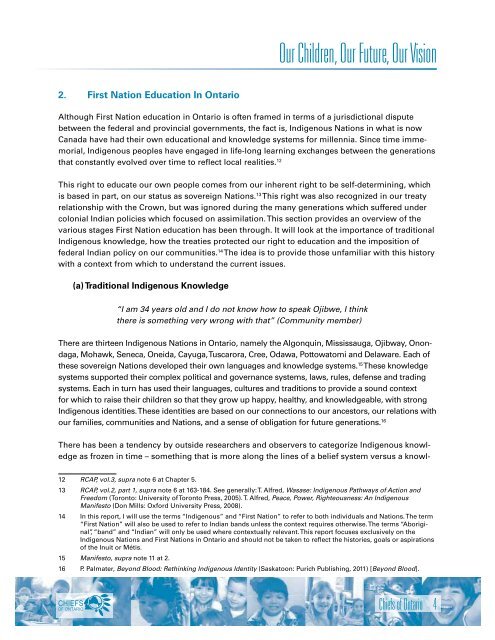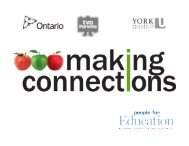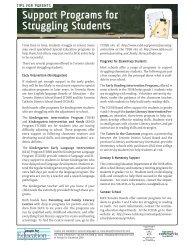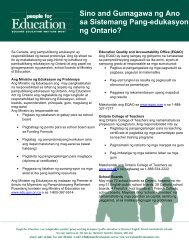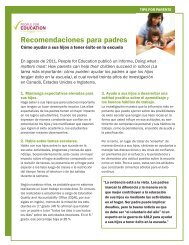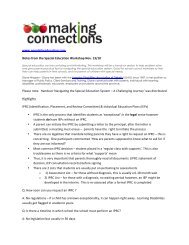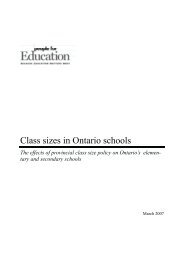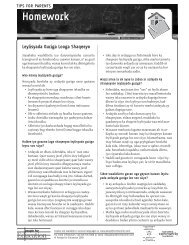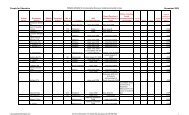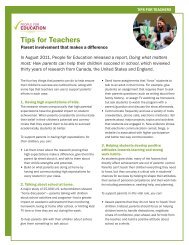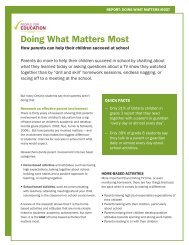Our Children Our Future Our Vision - People for Education
Our Children Our Future Our Vision - People for Education
Our Children Our Future Our Vision - People for Education
Create successful ePaper yourself
Turn your PDF publications into a flip-book with our unique Google optimized e-Paper software.
<strong>Our</strong> <strong>Children</strong>, <strong>Our</strong> <strong>Future</strong>, <strong>Our</strong> <strong>Vision</strong><br />
2. First Nation <strong>Education</strong> In Ontario<br />
Although First Nation education in Ontario is often framed in terms of a jurisdictional dispute<br />
between the federal and provincial governments, the fact is, Indigenous Nations in what is now<br />
Canada have had their own educational and knowledge systems <strong>for</strong> millennia. Since time immemorial,<br />
Indigenous peoples have engaged in life-long learning exchanges between the generations<br />
that constantly evolved over time to reflect local realities. 12<br />
This right to educate our own people comes from our inherent right to be self-determining, which<br />
is based in part, on our status as sovereign Nations. 13 This right was also recognized in our treaty<br />
relationship with the Crown, but was ignored during the many generations which suffered under<br />
colonial Indian policies which focused on assimilation. This section provides an overview of the<br />
various stages First Nation education has been through. It will look at the importance of traditional<br />
Indigenous knowledge, how the treaties protected our right to education and the imposition of<br />
federal Indian policy on our communities. 14 The idea is to provide those unfamiliar with this history<br />
with a context from which to understand the current issues.<br />
(a) Traditional Indigenous Knowledge<br />
“I am 34 years old and I do not know how to speak Ojibwe, I think<br />
there is something very wrong with that” (Community member)<br />
There are thirteen Indigenous Nations in Ontario, namely the Algonquin, Mississauga, Ojibway, Onondaga,<br />
Mohawk, Seneca, Oneida, Cayuga, Tuscarora, Cree, Odawa, Pottowatomi and Delaware. Each of<br />
these sovereign Nations developed their own languages and knowledge systems. 15 These knowledge<br />
systems supported their complex political and governance systems, laws, rules, defense and trading<br />
systems. Each in turn has used their languages, cultures and traditions to provide a sound context<br />
<strong>for</strong> which to raise their children so that they grow up happy, healthy, and knowledgeable, with strong<br />
Indigenous identities. These identities are based on our connections to our ancestors, our relations with<br />
our families, communities and Nations, and a sense of obligation <strong>for</strong> future generations. 16<br />
There has been a tendency by outside researchers and observers to categorize Indigenous knowledge<br />
as frozen in time – something that is more along the lines of a belief system versus a knowl-<br />
12 RCAP, vol.3, supra note 6 at Chapter 5.<br />
13 RCAP, vol.2, part 1, supra note 6 at 163-184. See generally: T. Alfred, Wasase: Indigenous Pathways of Action and<br />
Freedom (Toronto: University of Toronto Press, 2005). T. Alfred, Peace, Power, Righteousness: An Indigenous<br />
Manifesto (Don Mills: Ox<strong>for</strong>d University Press, 2008).<br />
14 In this report, I will use the terms “Indigenous” and “First Nation” to refer to both individuals and Nations. The term<br />
“First Nation” will also be used to refer to Indian bands unless the context requires otherwise. The terms “Aboriginal”,<br />
“band” and “Indian” will only be used where contextually relevant. This report focuses exclusively on the<br />
Indigenous Nations and First Nations in Ontario and should not be taken to reflect the histories, goals or aspirations<br />
of the Inuit or Métis.<br />
15 Manifesto, supra note 11 at 2.<br />
16 P. Palmater, Beyond Blood: Rethinking Indigenous Identity (Saskatoon: Purich Publishing, 2011) [Beyond Blood].<br />
Chiefs of Ontario<br />
4


